In the digital marketing, one cannot think about an online marketing campaign without having knowledge of keyword match type. You can call it as base for a PPC campaign. Google Ads allow campaign organizers to use keyword match type for the purpose of refining targeted keyword results.
While bidding on a particular keyword for your ad campaign, you have to select keyword match type, which helps in making the ad relevant to the keyword searches.
There are four kinds of keyword match type which you can select for the campaign while promoting your ads. With right use of keywords you can carry out your campaign goals. Here, you will know about all the four match types and how they vary from each other.
Keyword match type are categorized as broad, phrase, exact and broad match modifier now we will go through each type very carefully and their impacts on ad campaign.
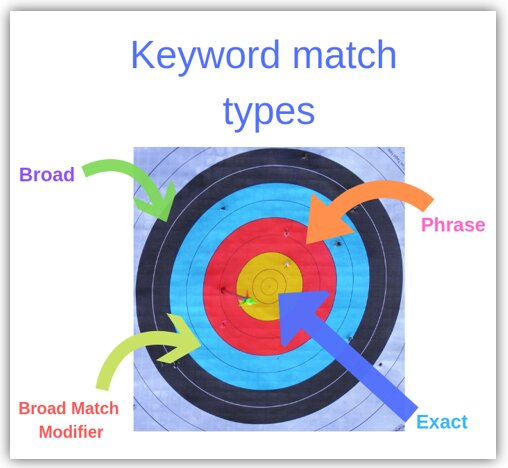
Different kinds of keyword match type can be justified as follows:
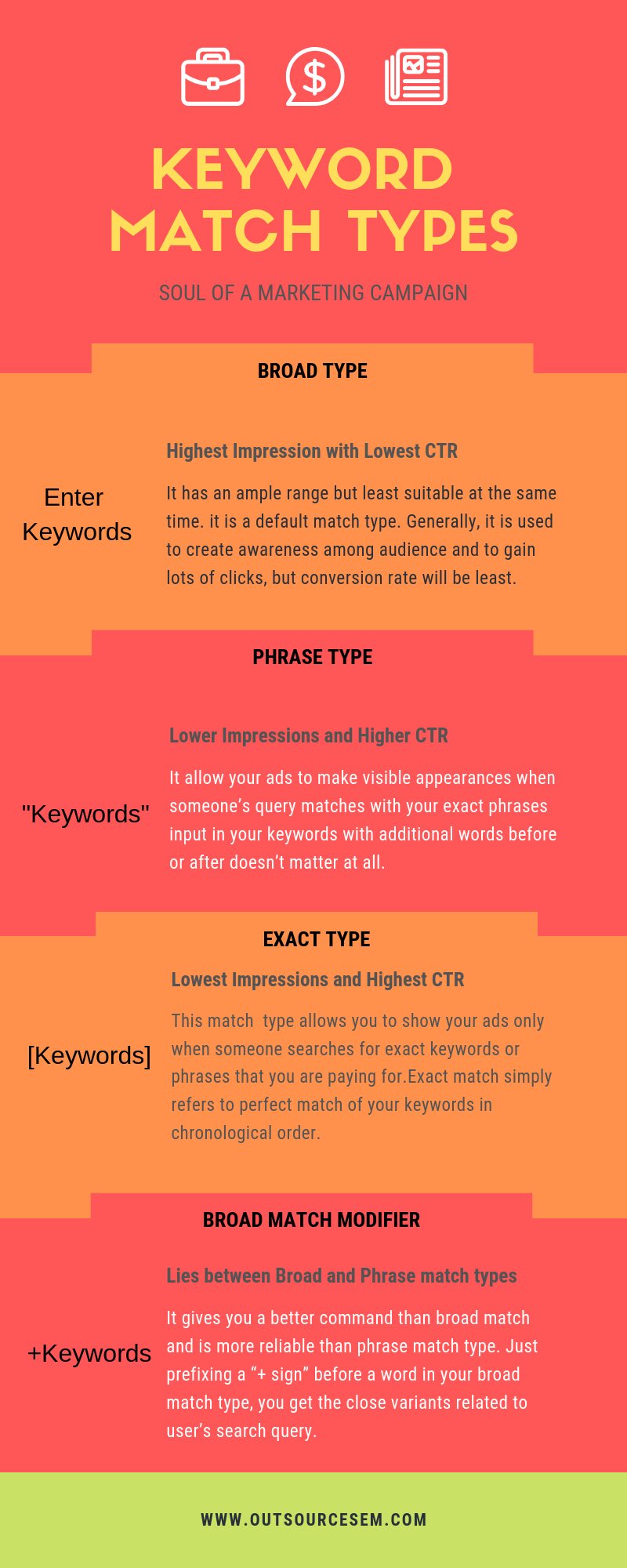
a) Broad match: The prime quality of the Broad match is that it has a bigger range but is preferred less. It’s a default match type, so if any searcher queries for any term which matches with your keyword phrases in any order, it will be shown up. Since, most people are not specific when searching for any information, they finish up typing broad match keywords and they come across a wide spectrum of search results.
Broad match is a great way to gain a lot of clicks, you can increase your site traffic but at the same time you need to look up that you are not paying for unnecessary traffic which are not going to convert.
Suppose you are using broad match on “glass”, then your ads may be shown up when anyone is searching for “eye glass, sunglass, window glass and many more”. It is because glass is common in all the keywords. Even in some cases, it is seen that the search engines also pick up the similar words or synonyms. For e.g. - when someone searches for “window reflector”, “glass” will be shown, which is not matching with your keyword term.
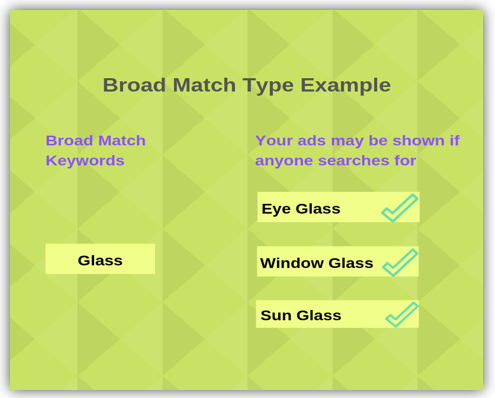
Advantages:
Various advantages of Broad match type are:
i. More traffic: If you have broad match in your account then chances are that your ad campaign traffic will be more. Generally, people have a mindset that broad match are not good for them, but if your main focus is on increasing brand awareness then you should go for it, it will reach a wider audience.
ii. Time for keywords creating: It requires less time for building keyword lists.
iii. Pay less: You need to pay only for those keywords that actually work.
Disadvantages:
Apart from above advantages, broad match also has its own demerit:
Despite having so many appearances, it won’t convert into number of clicks and conversions just because of irrelevant traffic.
b) Phrase match type: It allows your ads to make visible appearances when someone’s query matches with your exact phrases input in your keywords with additional words before or after doesn’t matter at all. Suppose your phrase match keywords are “men’s wear” then if any searcher queries for “men’s wear”, “men’s wear casual” and “formal men’s wear” then your ads will appear on search result pages. It’s a one of the four match type that help you to control how closely your keywords need to be matched with a person’s search term. Close variations include are text error, singular-plural, stemming and acronyms.
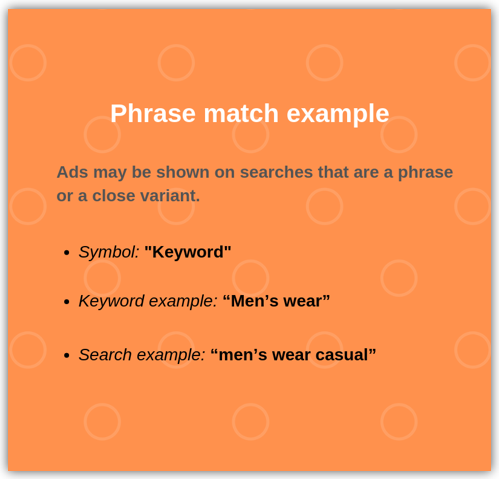
Now, the various advantages and disadvantages of using phrase type are as follows:
Advantages:
• In this match type, conversion rates will improve
• your ads will be more targeted.
Disadvantages:
The basic disadvantage is that users must have to enter your keywords in a systematic way otherwise it won’t appear.
c) Exact match type: This match type allows you to show your ads only when someone searches for exact keywords or phrases that you are paying for. exact match simply refers to perfect match of your keywords in chronological order. Out of four, only this match type enables you to specify the users you want to show your ads which in turn increases your click-through rate and higher conversion rate.
While using exact match type, your ads may not have higher impressions and clicks but it let you to gain more CTR (Click Through Rate). It is because your ads will only appear when someone searches for the same phrases or terms as par your mentioned keywords for the various products or services you offer.
In earlier days, exact type worked slightly different from now-a-days. Results were displayed only when proper match found in sequential order. But today, it gets altered for various misspellings, close variants, stemming, acronyms. This sledge down on the devoir of using huge number of variants in single ad group consistently. But again, Google changes the way it works, further expanding the close variants to match up with similar search queries.
For e.g.- suppose your exact match type keywords are “winter wear men” and if anyone searches for the query “men’s winter wear” then words will be recorded and results will be matched.
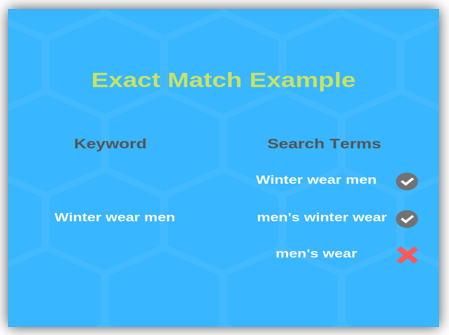
Now, we will discuss various advantages and disadvantages of using this type of match type, they are:
Advantages:
• You know it well that traffic is point targeted.
• You don’t need to worry about irrelevant matches.
Disadvantages:
• Users have to type exact phrases in same manner.
• It slices down a lot of traffic, that is ok to have as it will give refined results for ad copy but you have to work very hard to maintain your site traffic so that users specifically search for your products.
• Generally, in exact match type prices tends to be high, it’s fine if you think your conversion will be better, but what happens if results are not as per your desire, then it will affect your campaign budget.
d) Broad match modifier: This is another type of feature introduced by google in Google ads which is so flexible that may be every advertiser are thinking about it and which is known as broad match modifier. It lies in between broad match and phrase match type keywords. In short, it is written as BMM. It gives you a better command than broad match and is more reliable than Phrase match type. Just prefixing a “+ sign” before a word in your broad match type, you get the close variants related to user’s search query. Since, Broad match is a new intervene in the market, it’s getting more popular over phrase match because of no word order restriction.
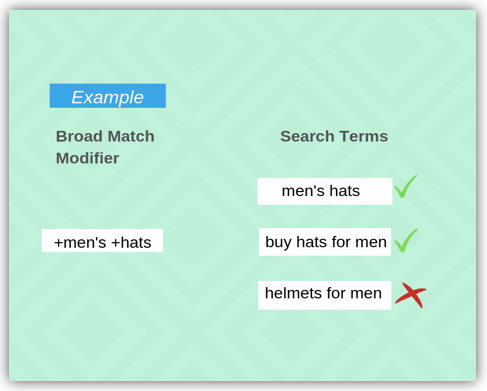
Instead of having so much reliability it also has different types of advantages and disadvantages, they are:
Advantages:
i. More impression: It will let you earn more impression for different queries because of no word order restriction.
ii. High traffic: Prefixing “+ sign” in your keywords helps to gain a lot of traffic for your ads. Same is the case with phrase and exact type, BMM generates more traffic, thus, improves click through rate and conversion rate. Hence, it enhances the overall traffic without completely excluding the characteristics of Broad Match Type.
iii. Flexibility of choosing the terms in modifier: One of the best part about this feature is that you are flexible to choose the particular keywords that could be list up in the modifier keyword strands. It also improves relevancy without offering too much of unnecessary traffic.
Disadvantages:
The main drawback it holds is that it has less impression volume at some point. No doubt, it will enhance the rate of traffic relevancy, but simultaneously it also works on the expense of cutting the traffic numbers. It is because synonyms and similar searches are excluded from the search results you can see that there is a decreasing impression volume.
For clear understanding, you can go through the table drawn below:

Points to Remember:
• You will get highest impressions and lowest CTR in Broad Match Types.
• You will get lower impressions and higher CTR in Phrase Match Types.
• You will get lowest impressions and highest CTR in Exact Match Types.
Selecting the appropriate keyword match types:
Opt for vast to miniature tactics:
Now, after getting proper understanding of these keyword match types you might be thinking of when, where and how to use it. You can use anyone from the above list as per your requirements for campaign but to get desired result you should choose from vast to miniature tactics i.e. from broad to exact.
Starting from the Broad will help you to create awareness among different users about your PPC campaign on relevant searches. Afterwards, keep your eyes on its performance at any particular interval of time, if you saw that site traffic is more of irrelevant searches then you can opt for adding a negative keyword to get legitimate outcomes. Even, you can shift towards miniature tactics to get an optimum result and divert more users towards your ad copy.
Look out for search terms which triggered your ads:
After getting desire clicks and impressions for your keywords, look out for the search terms report which will transparently state what different users searches for which triggers your ad.
Few points to be kept in mind before reviewing the report, they are:
• In the match type column, look carefully how search terms are closely related to your keywords, then and there you can adjust your keyword match types according to the results.
• Sometimes, it happens that your ad may be triggered due to search terms which aren’t in your keywords, so you can add these terms in your keywords.
• As discussed earlier, if irrelevant search terms trigger your ad, then you can avoid those terms by adding them as a negative keyword.
• Lastly, if you wish to get the better result, merge all the keyword match types (broad, phrase and exact) again and make a bid thereafter using a cascading bid system.
Conclusion:
Well, now you have got some good ideas about keyword match types, their needs, types and uses. We studied about how keyword match types can play an effective role in achieving your campaign goals, you came to know that selecting a right keyword match type will not only improve your conversion rates, but also it will not affect your budget range. We also studied about different kinds of keyword match types which rules over ad campaign, you got to know that there are four kinds of match type keywords- broad, phrase, exact and broad match modifier, what are their pros and cons, you also came to know that how choosing one match type over other can divert your campaign goals.
You found out that broad match type are the one with Highest Impressions and lowest CTR (Click-Through Rate). It makes maximum number of appearances but at the same time clicks and conversions are very much less due to irrelevant search query. So, you can opt this if your campaign priority is to create awareness.
Secondly, you read about phrase match type- its characteristics, application and how it is different from the Broad match type. We studied in phrase match type that it generates lower impressions and higher CTR.
Thereafter, you studied about the exact match type that it’s the only one with highest CTR but at the same time it will produce lowest impression volume.
You also got the idea about the another type of match type keyword which is known as broad match modifier. In this, we have to prefix “+ sign” before keyword terms. As a result, ads will be shown up on relevant search queries. There is also no word order restriction in this. So, it’s up to you and your campaign goals that which keyword match types will be suitable for you. If you find choosing the match type for your ad campaign you can avail of white label PPC services and hire PPC professionals with expertise in lead generation, running remarketng campaigns, campaign analysis, etc. and increase your advertising ROI.
#Ref
- What are keyword match types & how should you use them?
- Log in to post comments
